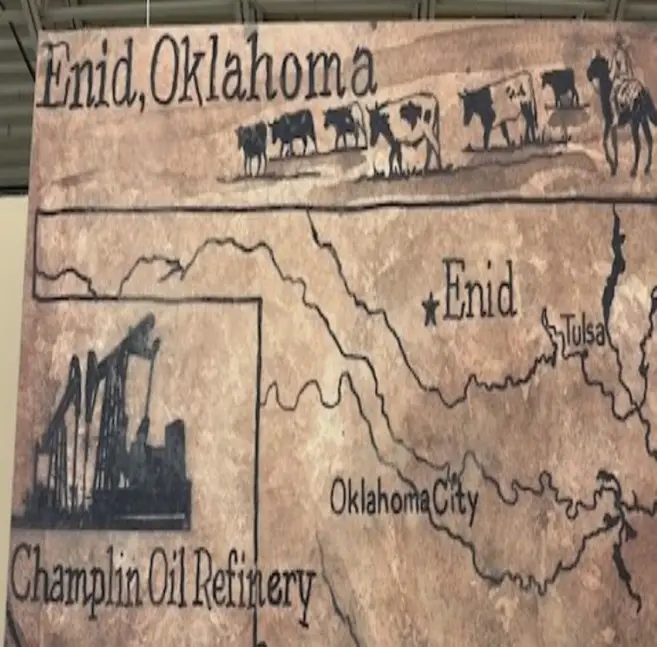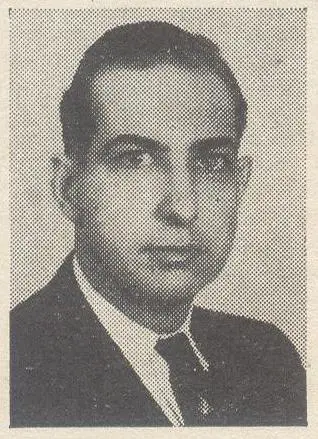Enid, Oklahoma (OK) has an interesting and varied baseball history from winning National Baseball Congress (NBC) Semi-Pro Tournaments in the 1930s and 1940s, to hosting National Junior College Athletic Association (NJCAA) Regional and National Tournaments in the 21st century. This city of 50,000 residents in Northwest OK is 100 miles north of Oklahoma City (OKC)—the capital—90 miles west of Tulsa, and 120 miles south of Wichita, Kansas. Coincidentally, the Tulsa Drillers are the Los Angeles Dodgers’ Class-AA franchise. The OKC 89ers are the Dodgers Class-AAA franchise. Mickey Mantle (Commerce) and Johnny Bench (Binger) are two of OK’s most famous baseball players. Part I focuses on Enid’s baseball legacy through 1937, winning the 1937 NBC tournament. Much information in Part I comes from “Semipro baseball’s golden era (1935-1941): a tale of two cities,” by Parr and Royse, published in Nine, on September 22, 2006. The author lived in an Enid RV Park when this was published.
Part I mentions the 1922 Enid Harvesters minor-league team, and Enid facing Satchel Paige in the 1936 Denver Post Tournament. It covers Duncan (aka Halliburton) defeating Paige in the 1937 double-elimination Denver Post Tournament won by Ciudad Trujillo from the Dominican Republic (DR). Part II covers Enid’s September 1940 trip to San Juan, Puerto Rico (PR) to face the 1939-40 Guayama Witches, in the second Semi-Pro World Series, and the September 1939 match-up between Guayama and Duncan Cementers from Oklahoma. Details on Arapaho, Oklahoma pitcher-outfielder Ellis “Cot” Deal, and his fine play for 1943-45 Enid Army Flying School Enidairs, will be in Part II. From 1935-1945, Enid was one of the nation’s best Semi-Pro baseball teams.
Background on Enid’s Minor League and Semi-Pro Baseball
Enid and Duncan—key supply points on the Chisholm Cattle Trail from South Texas to Dodge City, Kansas circa 1866-1885—first fielded baseball teams in the mid-1890s, before Oklahoma’s statehood in 1907. In 1895, Enid won Oklahoma’s Territorial baseball title, spurred by six Frantz brothers. Frank Frantz—one of the six—served under Rough Rider Colonel Teddy Roosevelt in the 1898 Spanish-American War. Roosevelt appointed Frank as Oklahoma’s last Territorial Governor. A generation later, lefty Carl Hubbell pitched for the 1923/1924 Cushing Refiners, Class-D Oklahoma State League, after the 1922 Enid Harvesters won 79.6 percent of their games (104-27) but fell to the Joplin Miners, four games to two, Class-C, Western Association finals. By 1927, Oklahoma had four minor-league teams, down from 21 in 1923. It had sanctioned state baseball tournaments from 1927-1948. Duncan and Enid became powerhouses in these events with Enid winning the 1934 title and fielding top-notch teams before World War II. Harry “The Cat” Brecheen, future St. Louis Cardinals pitcher from Broken Bow, Oklahoma, pitched for 1934 Enid, and defeated Purcell, 7-0, in the state tournament. Champlin Oil Refinery helped finance Enid’s Semi-Pro Baseball Team.

Illustration of Chisholm Cattle Trail and Champlin Oil Refinery. Author’s collection.
Raymond Dumont and Satchel Paige Headline First NBC Semi-Pro Tournament in 1935
A 1935 national double-elimination tournament, the brainchild of Raymond J. “Hap” Dumont, a Wichita, Kansas promoter, continues in Wichita to this day. From August 13-27, 1935, Enid joined Duncan as two of the thirty-two teams from twenty-four states to determine the first national semi-pro champion. Five teams were classified as “integrated,” including one with Native American players and another comprising Japanese players. The winning Bismarck (North Dakota) club had three African Americans: Satchel Paige—who received a $1,000 personal appearance contract—plus Chet Brewer and Quincy Trouppe. The tournament has been held annually in Wichita since 1935 with a double-elimination format. Big leaguers who played in it began with Paige and others in 1935. Later it included Allie Reynolds, Johnny Pesky, Billy Martin, Whitey Herzog, Tom Seaver, Chris Chambliss, Ron Guidry, Barry Bonds, Rafael Palmeiro, Roger Clemens, and many more. Since the mid-1960s, most of the teams have been comprised of nonprofessional collegians playing on summer teams.
Paige fanned 66 hitters in Wichita and allowed just 29 hits. After the final 1935 game, a 5-2 Bismarck Churchills win over Duncan, Cementers shortstop Joe Hassler, ex-infielder with the Philadelphia A’s and St. Louis Browns, stated: “I never faced a pitcher as fast as he [Paige] is. I think only Lefty Grove in his prime could come up with Paige in sheer speed. Satchel is not only a speedball pitcher, but also as smart as they make ‘em in the box… Paige would certainly make a great pitcher right now in the big leagues.”
Dumont’s special guest for the event’s 1935 banquet was Honus Wagner, destined for Cooperstown. The innovative Dumont established strict 20-second rules between pitches, recently adopted by MLB, and enforced a 90-second rule between innings for teams to continue play. A timer with a buzzer was installed on the outfield wall to enforce these rules. Dumont’s event facilitated an air device that could dust home plate!

Raymond Dumont
Duncan Prevails in 1936 NBC and Enid Wins Oklahoma Title
Enid, in 1936, was called the Enid Eason Oilers. They split 20 games in 1936 with their arch-rivals, the Duncan Halliburton Cementers. This intense rivalry preceded San Juan-Santurce in the PRWL, and was like Cuba’s Almendares-Havana rivalry, along with Licey-Escogido in the DR. There was a 1936 Denver Post Tournament before Wichita’s NBC event. Enid won three straight games in their state tournament and proceeded to finish second in Denver, losing the finale, 7-0, to Paige’s All-Stars. The great Satchel Paige fanned 18 Enid hitters in his two-hit SHO. Enid bested Bismarck, 8-2, in the 1936 NBC event but the Churchills played without their star Negro Leaguers from 1935. Enid lost to Buford, Georgia (5-4) and was then eliminated by arch-rival Duncan, 15-4. The Cementers were crowned NBC winners after topping Buford, 4-1, in the 1936 finals.
Halliburton’s owner, Earle P. Halliburton, per a detailed “Tale of Two Cities” blog, superstitiously stayed away from the national championship game «because “it looks like I’m a jinx to the team.» After the team returned to Duncan, all office and shop work was suspended for an hour while Halliburton employees congratulated the players and saw the championship trophy that was almost three feet high and weighed forty pounds. That afternoon Mr. Halliburton dispatched the company’s seven-passenger airplane on two roundtrips south two hundred miles along the old Chisholm Trail to Ft. Worth, Texas so that his team could board a special Pullman train car for Houston, Texas. After winning the national championship, Enid’s team returned to Oklahoma City on September 6 for the resumption of the semi-pro division of the Oklahoma state tournament. Enid won its third straight state championship by twice defeating the Shawnee Blackwell Oilers, 10-2 and 6-0.
The 1937 Oklahoma, Denver Post, and NBC Tournaments
Enid and Duncan played a best-of-nine series for the state title before competing in the July 29-August 9, 1937, Denver Post tournament. Duncan prevailed in Game Nine, 10-4, to break Enid’s streak of three straight titles. Les Munn—who became the nation’s best semi-pro pitcher in the late 1930s and early 1940s—won the finale. He once pitched for the Brooklyn Dodgers and the St. Louis Cardinals. The 6-5, 212-pound hurler was a combined 4-13 for Brooklyn, in 1934 and 1935, and 1936 St. Louis. Transitioning to Denver, Duncan and Enid competed with fourteen other teams from six states, Canada, and Ciudad Trujillo Dragons from the DR. Grover Cleveland Alexander managed Denver’s McVittes Restaurant team, who eliminated Enid via a 4-1 win. Tournament celebrities included «Slinging» Sammy Baugh, 1935 and 1936 All-America quarterback (and punter) for Texas Christian University, the shortstop for the Pampa, Texas Oilers, plus Rogers Hornsby, the recently fired St. Louis Browns manager. (Baugh got his nickname from a Texas sportswriter for his baseball ability and was inducted into the NFL Hall of Fame in 1963.) Hornsby hit the first homer of the tournament in his first at-bat for Denver’s Bay Refiners. Allie Reynolds, a future New York Yankees hurler, was in uniform for the Colorado state champion Leyden Miners but did not pitch due to their early elimination. Duncan reached the finals after defeating Ciudad Trujillo and Satchel Paige, 6-4, but lost the title game to the Dragons, an All-Star Team of top Negro Leaguers, including:
- Pitchers Ernest “Spoon” Carter, Satchel Paige, Robert Griffith, Leroy Matlock, and Chet Brewer; catchers Bill Perkins and Clarence Palm; infielders David “Showboat” Thomas, George Scales, Harry Williams, Pat Patterson, and Sammy Bankhead; outfielders Clyde Spearman, Ray Parnell, James “Cool Papa” Bell; and skipper Rap Dixon.
All had participated in a 1937 three-team DR summer tournament won by Ciudad Trujillo over the Águilas Cibaeñas and Estrellas Orientales. The Denver Post entry did not include catcher Joshua Gibson but comprised players from the three DR teams, albeit just Stateside imports. The DR event bankrupted semi-professional baseball on that island due to the exorbitant salaries paid to the Negro Leaguers, starting with $30,000 paid to Paige to recruit players. A summary of the 1937 Denver Post event includes:
- July 30—Chet Brewer’s 12-5 win versus Goalstones.
- August 1—Matlock blanks Seminole, 4-0.
- August 4—Griffith shuts out Bay Refiners, 12-0.
- August 6—Matlock (2-0) prevails, 17-4, over Borger.
- August 7—Brewer (2-0) tops McVitties, 12-1.
- August 8—Griffith (2-0) defeats Pampa, 10-1.
- August 9—Paige—who arrived in Denver after the August 8 contest—lost a 6-4 game to Duncan-Halliburton.
- August 9—Matlock (3-0) bests Duncan, 11-1, in seven-inning finale.

Satchel Paige, 1937 Ciudad Trujillo Dragons. Photo courtesy of Tony Piña Campora.
The Dragons outscored their opponents, 82-18. The Denver Post on August 4, 1937, noted: “The Negro Leagues Stars, known as Ciudad Trujillo, in the DR, continue being the main attraction in Denver.” After the conclusion of this event, Julio C. Linval—writing in La Opinión, a DR newspaper—stated: “A team with the nickname of the ‘Perfect Machine’ (Máquina Perfecta), could not lose.” It was DR strongman Rafael Leónidas Trujillo’s team, with funding help from the American Sugar Company. Trujillo used this team as a “tool” to remain in power. Ray Doan, a St. Louis Cardinals scout, affirmed—to The Denver Post—that “This [DR] team could beat any Major League club, including the [1937] New York Yankees.”
After not winning a tournament championship in 1937 in either Oklahoma or Denver, Enid—called the Eason Oilers—swept seven straights in the Wichita national Semi-Pro tournament. Buford, Georgia, eliminated defending champion Duncan, 2-1, to prevent an all-Oklahoma final. Enid won its first national championship as ex-House of David pitcher Bus Talley prevailed, 7-3, over Buford’s Bona Allen Shoemakers. The Oilers scored four in the second and three in the fourth. Talley’s four-hitter had zero strikeouts, before a Wichita event record attendance of 14,000. Claude Gilchrist, Enid’s shortstop, was the event’s MVP. The final Top 10 teams in Wichita were:
- Enid’s Eason Oilers
- Bona Allen (Buford) Shoemakers
- Mount Pleasant Cubs (Texas)
- Dormant Municipal (Pennsylvania)
- Duncan’s Halliburton Cementers
- Wichita Water Board
- Asheboro McCrary Mills (North Carolina)
- Tacoma Johnson Paints (Washington)
- Baltimore Glenburnie
- Arkansas City (Kansas) Dubbs
Postscript
On January 12, 2004, in the Stephens County Museum in Duncan, Oklahoma, ninety-five-year-old Jesse Welch, Duncan’s shortstop in the 1937 Denver Post tournament, was interviewed for the eventual September 22, 2006, article in Nine. The team’s batboy, J. D. Carter, added some insights. Welch denied the purposeful errors by the Dragons in Paige’s 6-4 defeat. And Welch, who received a pair of Florsheim shoes for being the tournament’s best infielder, noted that lefty Leroy Matlock “was a better pitcher than Satchel Paige.” The toughest pitcher ever for Welch to hit was Oklahoman Carl Hubbell, whom Welch batted against in exhibition games in Oklahoma. Welch and Carter also recalled the epic brawl in the Denver Post tournament game when Cool Papa Bell slid into and spiked Sammy Hale, the Pampa, Texas third baseman and ex-big leaguer. Welch said that he always played Bell «two steps in” due to Bell’s speed.
Jorge Colón Delgado did the editing and photo layouts.
